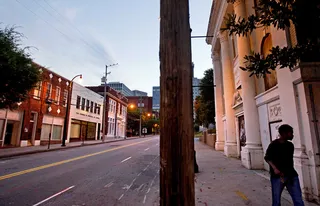Martin Luther King Jr.’s Birth Home Is Among Relics of Auburn Avenue
Atlanta’s Auburn Avenue is in peril.

1 / 16
Saving Auburn Avenue - Atlanta’s Auburn Avenue was once a bustling corridor lined with Black-owned banks, night clubs, churches, meat markets and funeral homes, but as the Associated Press reports, the historic neighborhood never fully recovered following the end of state-mandated segregation as many Blacks left for new neighborhoods previously unavailable to them. For the second time since 1992, Auburn Avenue, also Martin Luther King Jr.’s birth home, was added last week to the National Register of Historic Places’ Most Endangered list for 2011. Many residents say this designation is the final chance to protect the street’s fading legacy. — Britt Middleton (Photo: AP Photo/David Goldman)

2 / 16
Diamond in the Rough - Among the cracked streets and deserted buildings, the Atlanta Daily World newspaper building, the original home of the oldest continually Black-owned and controlled newspaper founded in 1928, still stands. The publishers left the historic building four years ago after it was ravaged by a tornado in 2008. (Photo: AP Photo/David Goldman)

3 / 16
Moving On - The publishers of the Atlanta Daily World newspaper building left the historic building four years ago after it was ravaged by a tornado in 2008. (Photo: AP Photo/David Goldman)
Photo By Photo: AP Photo/David Goldman

4 / 16
Paying Tribute - A visitor pays her respects at the crypt of Rev. Martin Luther King Jr. and his wife, Coretta, on Auburn Avenue. (Photo: AP Photo/David Goldman)

5 / 16
The King Home - The crumbling facades of townhomes in the Sweet Auburn Historic District can be seen from the porch of King’s birth home, shown above. King’s birth home is part of the King Historic Site run by the National Park Service and attracts more than 700,000 visitors a year. Twenty years ago, supporters stepped in to save the civil rights icon's birth home and restored much of the surrounding community. (Photo: AP Photo/David Goldman)
ADVERTISEMENT

6 / 16
A Change in Atmosphere - Patrons dance inside the Royal Peacock night club, a different scene today from when celebrities such as Joe Louis and Jackie Robinson were patrons and music legends including Ray Charles, Aretha Franklin and James Brown all graced the stage. (Photo: AP Photo/David Goldman)

7 / 16
A Beacon of Hope - The historic Big Bethel African Methodist Episcopal Church was started in 1847 for slaves by their slave holders and stands along Auburn Avenue today. (Photo: AP Photo/David Goldman)

8 / 16
Continuing the Tradition - “Generations ago, much of Auburn Avenue's prosperity was born out of necessity, a product of segregation. The downtown thoroughfare anchored a community of homes and businesses that depended on each other,” writes the AP. Above, Ricci DeForest washes the hair of a client at the Madame C.J. Walker Museum, an original beauty shop opened in 1950. (Photo: AP Photo/David Goldman)

9 / 16
The Day the Music Stopped - The Prince Hall Masonic Temple and Tabor Building along Auburn Avenue once housed America's first Black owned and operated radio station. "If we lose any more historic fabric, Auburn Avenue will probably lose its historic designation. You can't just have a few buildings left," Mtaminika Youngblood, chairwoman of the Historic District Development Corporation, told the AP. (Photo: AP Photo/David Goldman)

10 / 16
Living History - National Park Rangers survey the original Atlanta Life Insurance Company building, which decades ago offered insurance to Blacks when white-owned banks would not. “These historic buildings become living, tangible artifacts of Black Atlanta," Atlanta historian Skip Mason said in the AP’s report. (Photo: AP Photo/David Goldman)
ADVERTISEMENT

11 / 16
Ghosts of Prosperity - "It was sad to see it go into decline," Alexis Scott, publisher of the Atlanta Daily World, told the AP. "It was even more sad to look across the street and see the old buildings boarded up. I don't want to see the rest of the buildings fall down from disrepair and people's inability to do anything about it.” (Photo: AP Photo/David Goldman)

12 / 16
An Uncertain Future - The Cox Brothers Funeral Home, Atlanta’s oldest Black-owned funeral home, was part of Auburn Avenue’s heyday in decades past. Owner Carlton Webb takes a moment to reflect on the home, above. (Photo: AP Photo/David Goldman)

13 / 16
King’s Legacy - Tourists visit the Ebenezer Baptist Church where Rev. Martin Luther King Jr. preached. (Photo: AP Photo/David Goldman)

14 / 16
Roads to the Future - A live-work development built just before the recession failed to bring businesses back to the area. While construction on a major interstate is underway on Auburn Avenue, “down the street on neighboring Edgewood Avenue — which runs parallel to Auburn — popular bars and restaurants have sprung up in historic buildings, and a $47 million streetcar project is aimed at attracting more businesses and patrons to the area,” writes the AP. (Photo: AP Photo/David Goldman)

15 / 16
Segregation in Action - Auburn Avenue resident Charlie Mitchell, 73, stands outside the Butler Street YMCA, used in 1948 for Atlanta's first Black police officers to change into their uniforms as they weren't allowed to use the police station. (Photo: AP Photo/David Goldman)
